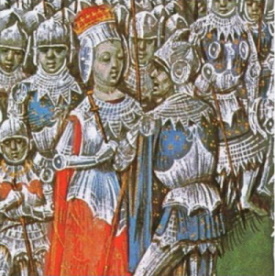Roger Mortimer and Queen Isabella
In the early years of her marriage to King Edward II, Queen Isabella found herself a poor second in Edward’s affections to Piers Gaveston (d1312), a French knight. Years later she was in the same position again, though this time the favourite was Hugh Despenser the Younger (d1326). With her influence at court reduced, and even her access to her husband controlled by the new favourite, she used the pretext of diplomatic negotiations with her brother, King Charles IV, to flee to France in 1325. Later her son, the future King Edward III, joined her.
There she met the dynamic Roger Mortimer (d1330) himself an exile. Roger had for years been a supporter of the King, ruling Ireland for a time in the King’s name and then putting down the rebellion of Llywelyn Bren, as well as besieging and overcoming the rebellious town of Bristol. When his own lands and interests were threatened by the Despensers, however, Roger also rebelled. Confined in the Tower of London in 1322 with his uncle Roger Mortimer of Chirk, he was one of the few men ever to escape, finding refuge in the French court.

Roger was energetic, dominant and determined – everything that Edward II was not. It is hardly surprising that Isabella should have been attracted to him. They were both determined to get rid of Hugh Despenser and realized that the only way of doing this was by force. With help from supporters in the Low Countries they sailed from Dordrecht in 1326 with a small private army and landed at Orwell. Edward II’s support melted away, the Despensers were executed, and Roger and Isabella were soon in charge. They forced Edward to resign his crown in favour of his young son Edward III and then ruled England themselves in his name. The traditional story is that Edward II was done to death in a particularly nasty way at Berkeley Castle in Gloucestershire, but it now seems possible that he remained alive for many years on the Continent*.
Now the effective Ruler of England, Roger made the most of his position. He used it to enrich himself and had himself created Earl of March. Arrogant and acquisitive, he was soon resented as much as Gaveston and Despenser had been. As the illicit lover of the Queen, with no official title as Regent and very unpopular, his position was soon under threat. The young King Edward clearly found the constraints put on him during his minority very irksome and as soon as he reached the age of eighteen, in 1330, he had Roger arrested and executed.
Although Roger’s lands and titles were forfeited, the family did not stay in the doldrums for long. Under Roger’s grandson, another Roger, they managed to regain all their fame and wealth.
* See The Greatest Traitor by Ian Mortimer (Jonathan Cape 2003)